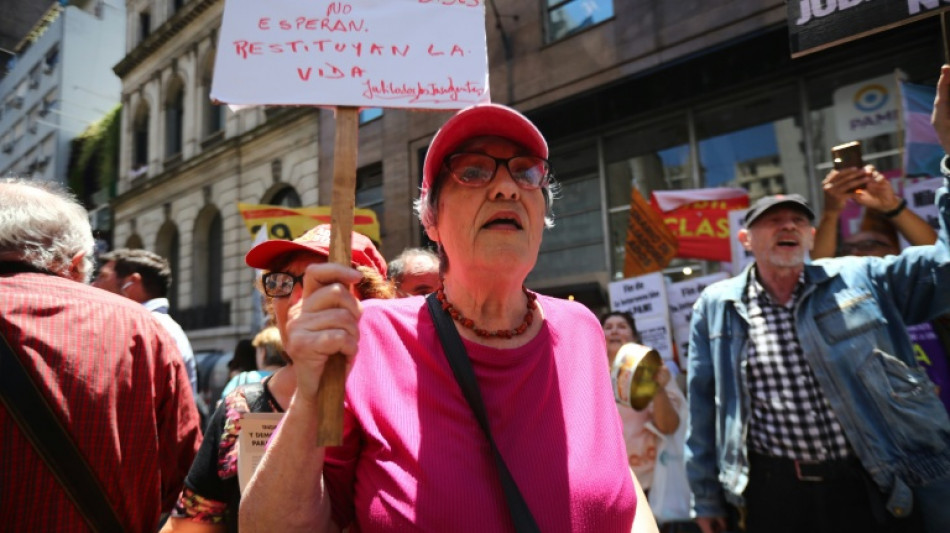
NGG
0.2400


Alicia Ceresoli yearns for the smell of new leather shoes and her mouth waters when she imagines sinking her teeth into a succulent steak, two indulgences the 80-year-old Argentine can no longer afford.
Pensioners have taken the most pain in a year of budget-slashing by maverick "anarcho-capitalist" President Javier Milei, whose austerity measures have tipped an additional five million people into poverty since he took power last year.
In September he vetoed a law that increased pensions by eight percent -- a fraction of the increase needed to keep abreast of annual inflation of nearly 200 percent.
"You think, why does someone who is leading a country have to shut down your life? It's as if they told you 'Don't eat, don't buy medicine, just die'," Ceresoli said bitterly.
Ceresoli, who is divorced, admits her situation could be far worse.
She owns her small home in the working-class Buenos Aires suburb of Villa Adelina, meaning she is not affected by the libertarian Milei's decision to demolish rent controls.
And she is in good health, meaning that, for now at least, she is not affected by drug prices, which have shot up by 200 percent since Milei scrapped agreements with laboratories that kept drug prices low.
Ceresoli is one of nearly five million retirees trying to eke out an existence on a pension of around $320 a month, a third of what the average elderly person needs to live, according to Argentina's Ombudsman's office.
- 30 cents a day -
This month, she will receive a pension increase of 2.7 percent.
"It's grotesque, that's 300 pesos per day," said Eugenio Semino, Argentina's Ombudsman for the elderly, of the boost equivalent to three cents.
Milei, who has made it his mission to keep the budget deficit at zero after years of overspending, has insisted there is no money to significantly raise pensions.
"Pensioners are the big losers" of Milei's presidency, Gabriel Vommaro, professor of political sociology at the University of San Martin told AFP.
"When you look at the fiscal adjustment that was made this year, it largely fell on retirees."
- Living small -
Ceresoli, who began work aged 13 in a shoe factory, has sacrificed comforts great and small in her twilight years.
She used to treat herself to fresh flowers for the dining table "because they brighten up the house" but now has to settle for plastic blooms.
She no longer eats beef, an abiding passion in one of the world's top meat-loving countries, but which is now prohibitively expensive for many.
She misses "the smell of new leather sandals" and outings to the cinema followed by a pizza with a friend.
"It wasn't five-star luxury, but we were happy," she said.
"Now we are becoming bitter because life is getting smaller."
Her greatest sorrow, however, is no longer being able to afford to travel to see her only daughter and two grandchildren, who live 300 kilometers away.
"My heart hurts because my youngest granddaughter is 10 years old and her childhood is passing by," she said.
- Greying 'insurgents' -
Every Wednesday, she joins a group of self-described "insurgent retirees" who have been protesting outside Congress for a "decent" pension for the past eight years.
"It's not new that we're in a bad way but we're worse off than ever," she said.
The protesters are repeatedly tear-gassed and even beaten by riot police, but Ceresoli is adamant about the need to "make noise."
Ruben Cocorullo, a retired 76-year-old electro-mechanical technician, is also a regular at the Wednesday protests.
Cocorullo, who has been fitted with three stents, used to receive free medication for his heart condition.
But cuts to drug coverage for retirees means now he has to pay for the treatment himself -- a situation he says involves deciding whether "to eat or buy medicine."
To make ends meet he repairs old electrical devices he finds in the trash.
"I'm not ashamed," he told AFP outside Congress, adding: "It is this government and the criminals inside it, who do not defend us, who should be ashamed."
K.Hashimoto--JT